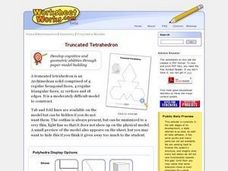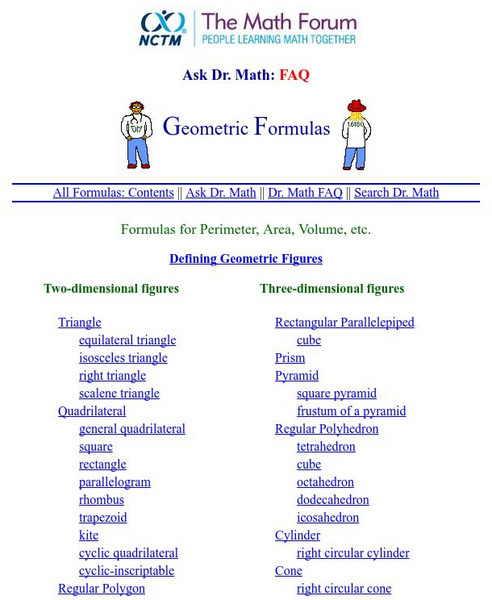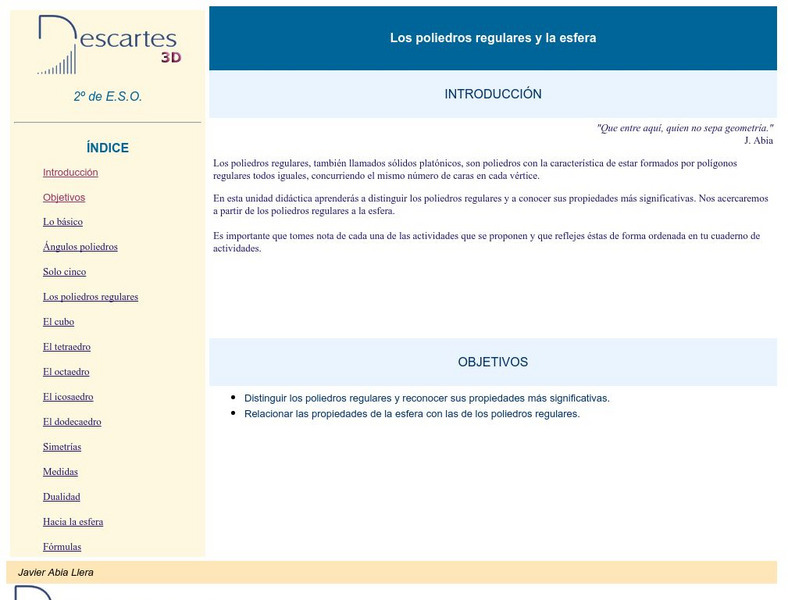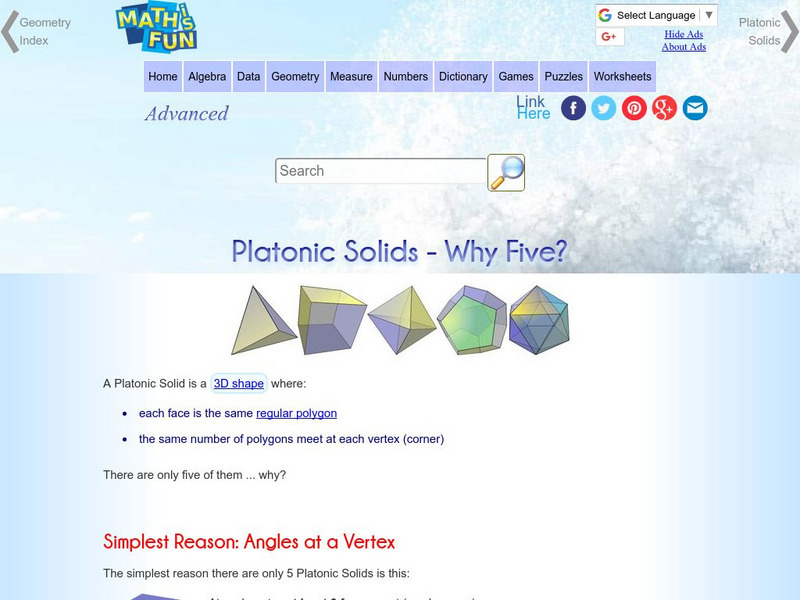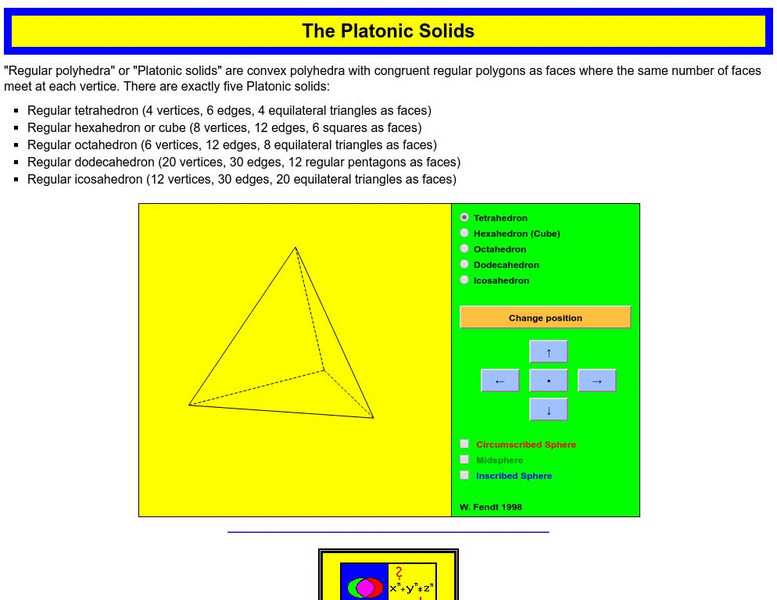Curated OER
Silica Tetrahedron Model
Very simply, pairs of learners construct a model of the tetrahedral silica structure using raisins and toothpicks. They dip it into a soapy solution and then blow a bubble "atom" into its center. The lesson plan gives instructions that...
Curated OER
Countdown Challenge: Platonic Solids - Part I
Use a Platonic solids worksheet to record the number of faces, edges, and vertices of five polyhedra whose faces, edges, and vertices are all identical. For each figure, learners write a proof of Euler's formula (F+V=E+2). They create a...
Curated OER
Revise Identifying 3-D Shapes
In this 3-D shapes activity, students practice identifying 8 3-D shapes with their following precise names: cube, cuboid, square based pyramid, cone, cylinder, tetrahedron, octagonal prism and hexagonal prism.
Curated OER
Truncated Tetrahedron
In this math worksheet, middle schoolers read about the truncated tetrahedron and then create a paper model. It should look like a solid comprised of 4 regular hexagonal faces, 4 regular triangular. faces, 12 vertices and 18 edges.
Curated OER
Tetrahedron
In this math worksheet, students construct a paper model of a tetrahedron. They create it to have four triangle faces, four vertices and six edges.
Curated OER
Investigating Nets and Polyhedra
Fifth graders create a net for a given polyhedron. They determine the corresponding polyhedron for a given net. Students investigate several polyhedra (cube, tetrahedron, and one of their choosing) and their corresponding nets. They...
Curated OER
Crystal Structure Lab
Students study and examine crystal shape. They create the two basic unit cells (one a tetrahedron) out of pipe cleaners and dip them into soapy water to see if they can form bubbles to represent a silicon atom in the center of a...
Curated OER
Volume Of Tetrahedron With Congruent Faces
Ninth graders investigate the concept of a tetrahedron and how it is formed with its congruent faces. They practice making the shape by practicing the folding paper to create the shape. Students continue the lesson with the estimation...
National Council of Teachers of Mathematics
The Math Forum: Ask Dr. Math: Faq, Geometric Figures
This page brings you to a table of contents of three-dimensional figures. Selecting a figure will bring you to a page defining and illustrating the figure with applicable formulas listed.
Cool Math
Coolmath: Coolmath4kids: Polyhedra Gallery
A gallery of complex polyhedra with descriptions and characteristics.
Cuemath
Cuemath: Platonic Solids
Learn more about platonic sold geometry, understand the platonic solid names, view some solved examples, and try your hand at some interactive problems.
Cuemath
Cuemath: Tetrahedron
A comprehensive guide for learning all about tetrahedrons with definitions, properties, formulas, examples, and practice questions.
Wolfram Research
Wolfram Math World: Tetrahedron
This math site defines a tetrahedron, gives reference to the Platonic solid, and gives views from varying perspectives. It also provides formulas for veritices of a tetrahedron lieing along the the positive X axis, formulas for area,...
National Council of Teachers of Mathematics
The Math Forum: Studying Polyhedra
This site not only defines what a polyhedron is, but it allows you to view each of the five regular polyhedra through an interactive exercise. After selecting which polyhedron you'd like to see, it will tell you its name and how many...
Ministry of Education and Universities of the Region of Murcia (Spain)
Ministerio De Educacion Y Ciencia: Los Poliedros Regulars Y La Esfera
Interactive resources and activities dealing with properties and characteristic of the five polyhedrons and the sphere.
Oswego City School District
Regents Exam Prep Center: Platonic Solids
Did you know that the five regular platonic solids (tetrahedron, octahedron, icosahedron, cube, and dodecahedron) were thought to represent earth, air, fire, water, and the universe? This chart shows an image and provides a description...
PBS
Pbs: Mathline: Let's Face It [Pdf]
Check out this math project about polyhedra! Students will enjoy the hands-on activity while they learn about tetrahedrons, hexahedrons, octahedrons, dodecahedrons, and icosahedrons. [Requires Adobe Reader.]
Math Is Fun
Math Is Fun: Platonic Solids: Why Five?
Use Euler's Formula and properties of known platonic solids' faces, edges, and vertices to determine why only five platonic solids exist.
Oswego City School District
Regents Exam Prep Center: Polyhedra
View and learn about five different polyhedra: tetrahedron, octahedron, icosahedron, hexahedron, and dodecahedron. Learn what Euler's Polyhedra Theorem is, and see examples of non-polyhedra as well.
University of Georgia
University of Georgia: Inter Math: Platonic Solids
This site gives a description of platonic solids along with a visual representation of each of the five platonic solids. At the bottom of the page are links to cut-out-templates for each of the platonic solids. Be sure to follow the...
Walter Fendt
Walter Fendt: The Platonic Solids
A short interactive activity to visualize the different platonic solids. You can also change the axis of rotation.
Other
Math Pages: Heron's Formula for Tetrahedra
This article explains how Heron's formula is very similar to Pythagoras' Theorem.
Creative Science Centre
Creative Science Centre: Shapes Platonic and Archimedean Solids
The 'Platonic solids' are three-dimensional shapes formed by putting together identical regular faces. Every corner and every edge is identical to every other corner and edge. There are five such 'solids': the tetrahedron, cube,...
Math Slice
Math Slice: Math Match Game
Test your geometry aptitude using this interactive matching game. Match pictures and symbols to the correct definition. Answers are verified immediately. Winners can earn as much as 10,000 dollars and have their name posted for the day.





